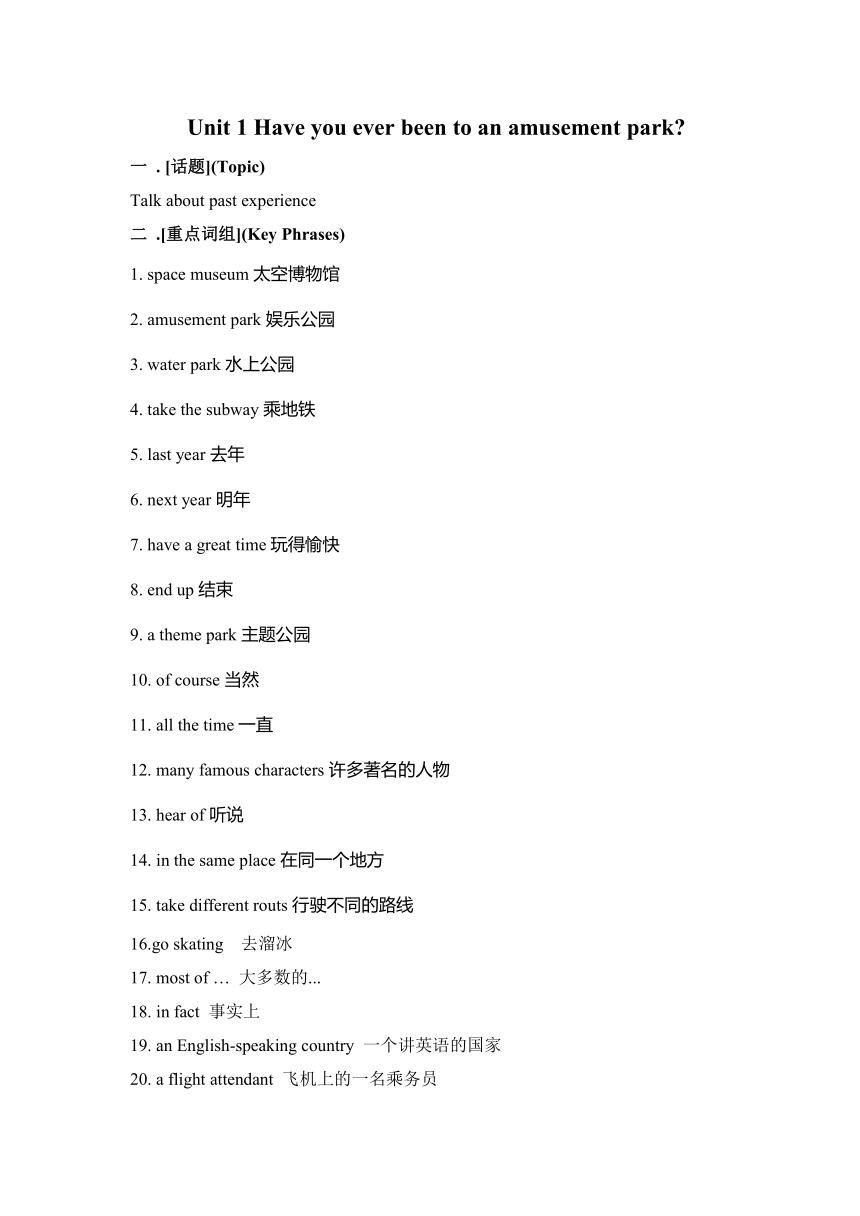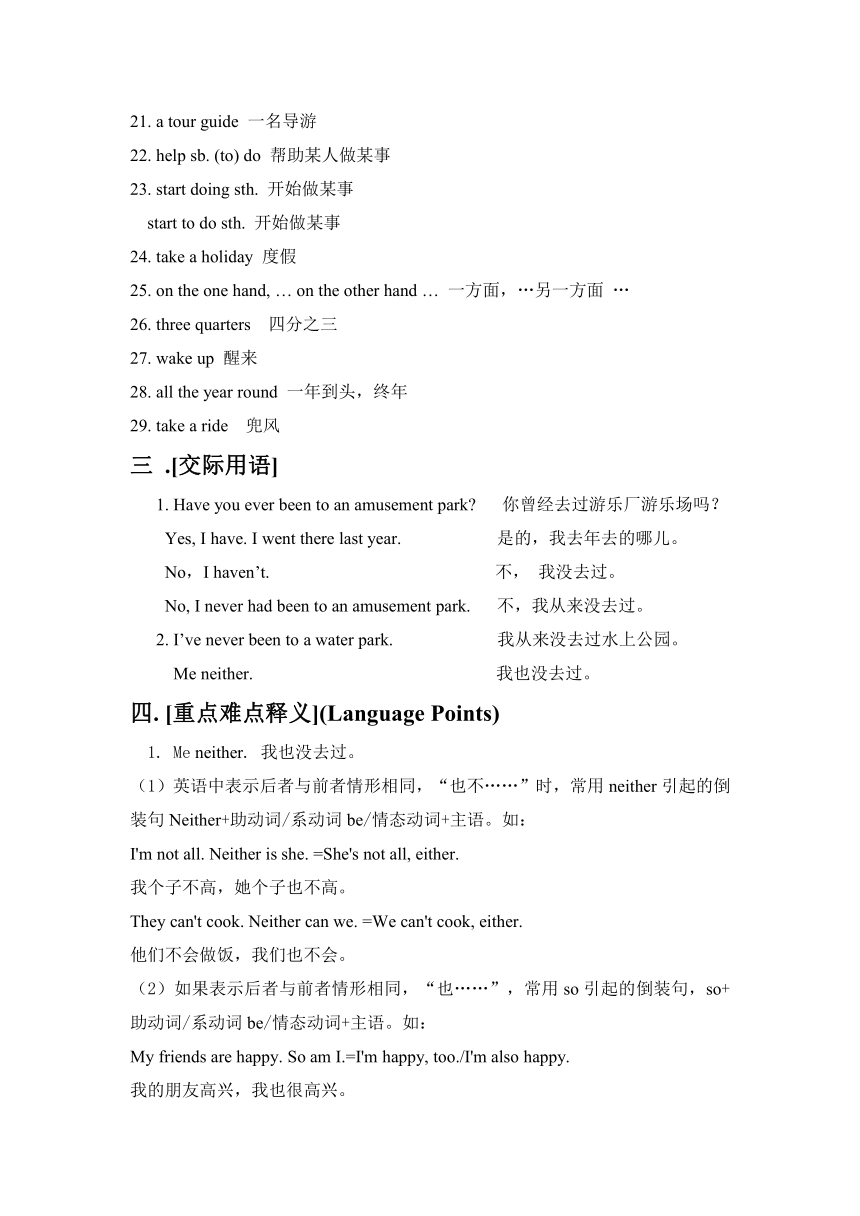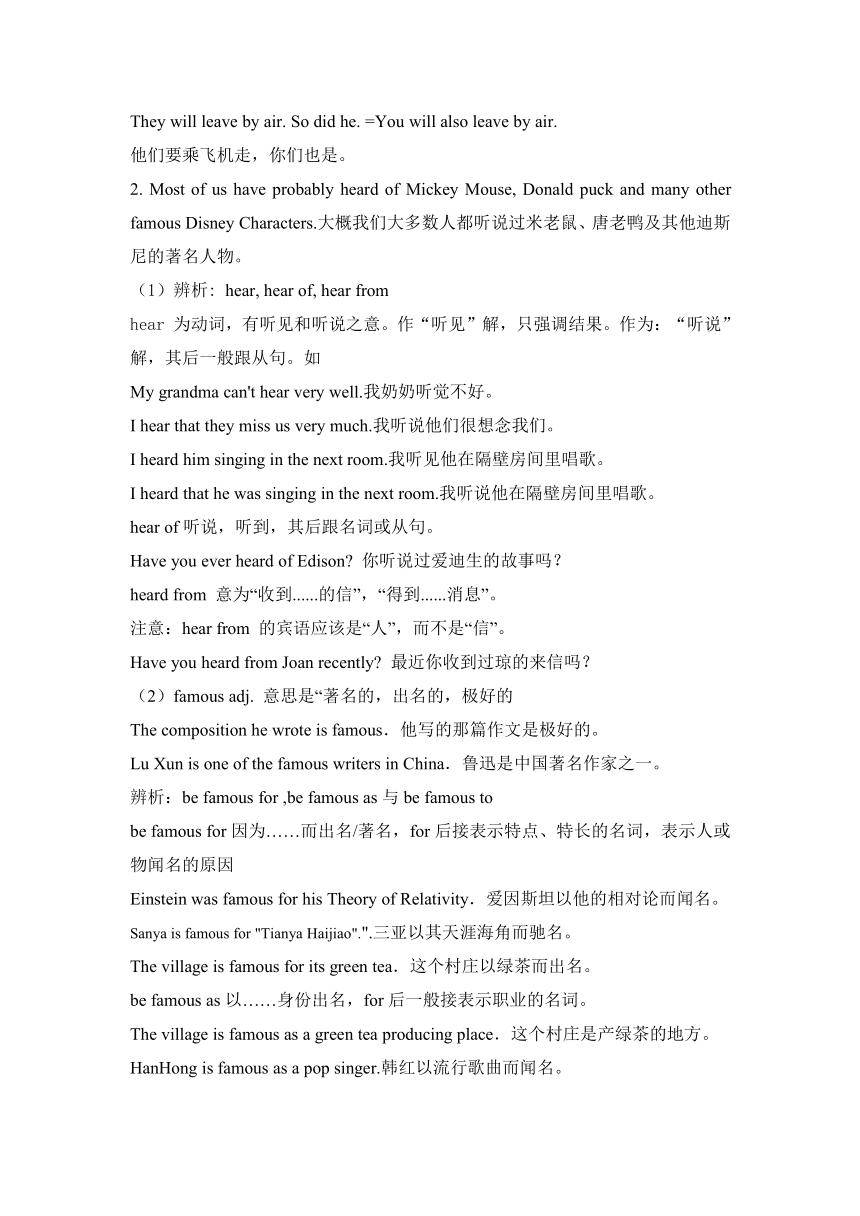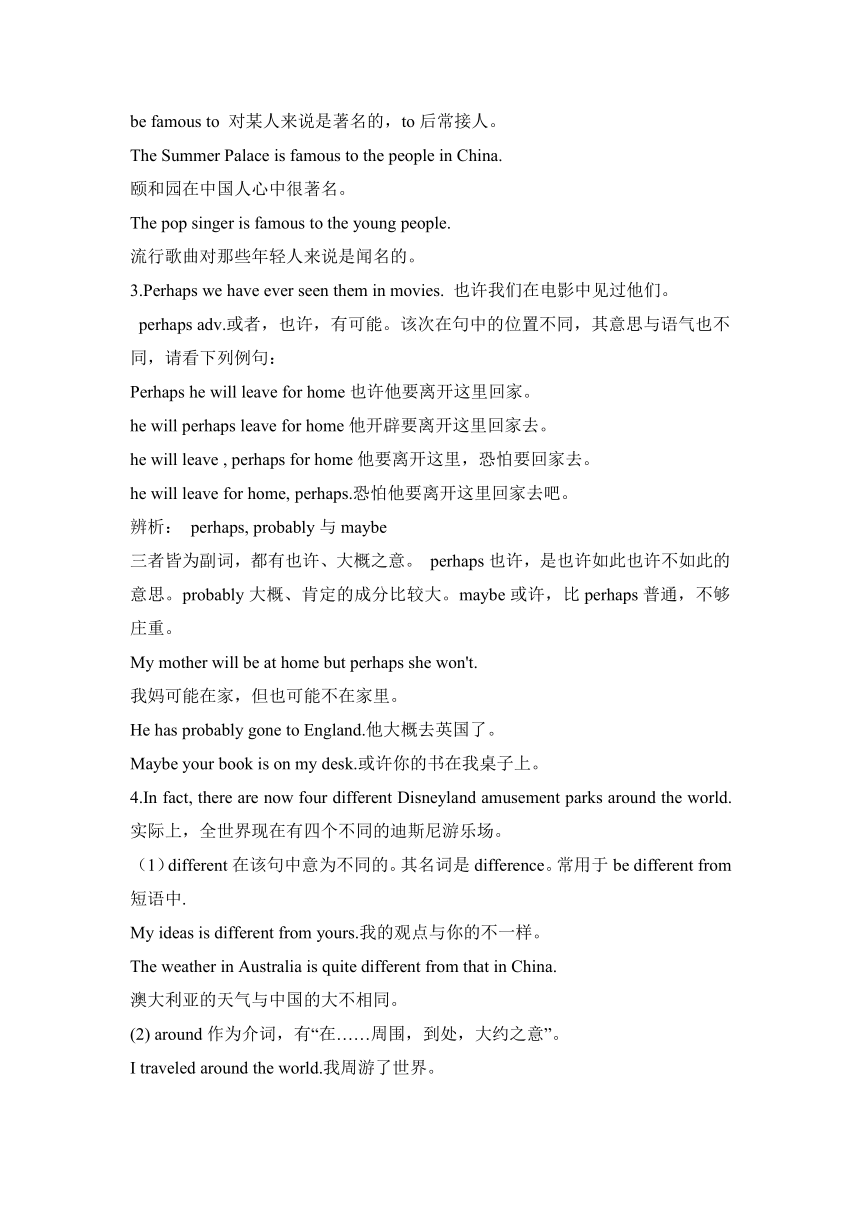Unit 1 Have you ever been to an amusement park
文档属性
| 名称 | Unit 1 Have you ever been to an amusement park |  | |
| 格式 | zip | ||
| 文件大小 | 19.1KB | ||
| 资源类型 | 教案 | ||
| 版本资源 | 鲁教版(五四学制) | ||
| 科目 | 英语 | ||
| 更新时间 | 2012-03-05 16:50:48 | ||
图片预览




文档简介
Unit 1 Have you ever been to an amusement park
一 . [话题](Topic)
Talk about past experience
二 .[重点词组](Key Phrases)
1. space museum太空博物馆
2. amusement park娱乐公园
3. water park水上公园
4. take the subway乘地铁
5. last year去年
6. next year明年
7. have a great time玩得愉快
8. end up结束
9. a theme park主题公园
10. of course当然
11. all the time一直
12. many famous characters许多著名的人物
13. hear of听说
14. in the same place在同一个地方
15. take different routs行驶不同的路线
16.go skating 去溜冰
17. most of … 大多数的...
18. in fact 事实上
19. an English-speaking country 一个讲英语的国家
20. a flight attendant 飞机上的一名乘务员
21. a tour guide 一名导游
22. help sb. (to) do 帮助某人做某事
23. start doing sth. 开始做某事
start to do sth. 开始做某事
24. take a holiday 度假
25. on the one hand, … on the other hand … 一方面,…另一方面 …
26. three quarters 四分之三
27. wake up 醒来
28. all the year round 一年到头,终年
29. take a ride 兜风
三 .[交际用语]
1. Have you ever been to an amusement park 你曾经去过游乐厂游乐场吗?
Yes, I have. I went there last year. 是的,我去年去的哪儿。
No,I haven’t. 不, 我没去过。
No, I never had been to an amusement park. 不,我从来没去过。
2. I’ve never been to a water park. 我从来没去过水上公园。
Me neither. 我也没去过。
四. [重点难点释义](Language Points)
1. Me neither. 我也没去过。
(1)英语中表示后者与前者情形相同,“也不……”时,常用neither引起的倒装句Neither+助动词/系动词be/情态动词+主语。如:
I'm not all. Neither is she. =She's not all, either.
我个子不高,她个子也不高。
They can't cook. Neither can we. =We can't cook, either.
他们不会做饭,我们也不会。
(2)如果表示后者与前者情形相同,“也……”,常用so引起的倒装句,so+助动词/系动词be/情态动词+主语。如:
My friends are happy. So am I.=I'm happy, too./I'm also happy.
我的朋友高兴,我也很高兴。
They will leave by air. So did he. =You will also leave by air.
他们要乘飞机走,你们也是。
2. Most of us have probably heard of Mickey Mouse, Donald puck and many other famous Disney Characters.大概我们大多数人都听说过米老鼠、唐老鸭及其他迪斯尼的著名人物。
(1)辨析: hear, hear of, hear from
hear 为动词,有听见和听说之意。作“听见”解,只强调结果。作为:“听说”解,其后一般跟从句。如
My grandma can't hear very well.我奶奶听觉不好。
I hear that they miss us very much.我听说他们很想念我们。
I heard him singing in the next room.我听见他在隔壁房间里唱歌。
I heard that he was singing in the next room.我听说他在隔壁房间里唱歌。
hear of听说,听到,其后跟名词或从句。
Have you ever heard of Edison 你听说过爱迪生的故事吗?
heard from 意为“收到......的信”,“得到......消息”。
注意:hear from 的宾语应该是“人”,而不是“信”。
Have you heard from Joan recently 最近你收到过琼的来信吗?
(2)famous adj. 意思是“著名的,出名的,极好的
The composition he wrote is famous.他写的那篇作文是极好的。
Lu Xun is one of the famous writers in China.鲁迅是中国著名作家之一。
辨析:be famous for ,be famous as与be famous to
be famous for因为……而出名/著名,for后接表示特点、特长的名词,表示人或物闻名的原因
Einstein was famous for his Theory of Relativity.爱因斯坦以他的相对论而闻名。
Sanya is famous for "Tianya Haijiao".".三亚以其天涯海角而驰名。
The village is famous for its green tea.这个村庄以绿茶而出名。
be famous as以……身份出名,for后一般接表示职业的名词。
The village is famous as a green tea producing place.这个村庄是产绿茶的地方。
HanHong is famous as a pop singer.韩红以流行歌曲而闻名。
be famous to 对某人来说是著名的,to后常接人。
The Summer Palace is famous to the people in China.
颐和园在中国人心中很著名。
The pop singer is famous to the young people.
流行歌曲对那些年轻人来说是闻名的。
3.Perhaps we have ever seen them in movies. 也许我们在电影中见过他们。
perhaps adv.或者,也许,有可能。该次在句中的位置不同,其意思与语气也不同,请看下列例句:
Perhaps he will leave for home也许他要离开这里回家。
he will perhaps leave for home他开辟要离开这里回家去。
he will leave , perhaps for home他要离开这里,恐怕要回家去。
he will leave for home, perhaps.恐怕他要离开这里回家去吧。
辨析: perhaps, probably与maybe
三者皆为副词,都有也许、大概之意。 perhaps也许,是也许如此也许不如此的意思。probably大概、肯定的成分比较大。maybe或许,比perhaps普通,不够庄重。
My mother will be at home but perhaps she won't.
我妈可能在家,但也可能不在家里。
He has probably gone to England.他大概去英国了。
Maybe your book is on my desk.或许你的书在我桌子上。
4.In fact, there are now four different Disneyland amusement parks around the world.实际上,全世界现在有四个不同的迪斯尼游乐场。
(1)different在该句中意为不同的。其名词是difference。常用于be different from短语中.
My ideas is different from yours.我的观点与你的不一样。
The weather in Australia is quite different from that in China.
澳大利亚的天气与中国的大不相同。
(2) around作为介词,有“在……周围,到处,大约之意”。
I traveled around the world.我周游了世界。
It's around/about ten o'clock.大约有10点了。
around还可作副词用,表示在周围,在附近,到处,各处等。
They found nothing around.他们发现附近没什么东西。
We travel around together.我们一起到各地旅游。
5. This means that you can find Disney characters all over the roller coaster.
那意味着你会在旱冰场上到处看见迪斯尼的知名人物。
(1)mean表示“意味着”用来表示人的言论或行为,某一标志或词语的意思所指。
What do you mean 你的话是什么意思。
What does this word mean =What's the meaning of this word 这个词是什么意思?
(2)意欲,打算
He means to go tomorrow.他打算明天去。
He meant no harm; he only meant to help.他没有恶意,仅想帮忙。
(3)有意义,有价值,常和much, little等连用。
His work means o lot of him. 他的工作对他意义很大。
It doesn't mean a thing to her that we are all waiting because she's late.
因为他迟到我们都在等他,可他却认为这不是什么大不了的事。
6. You won't have any problem finding rice, noodles, dumplings.
你回毫不费力地找到米饭、面条、水饺。
have problems (in) doing 这一结构表示“做谋事很费劲”。介词in指某一方面,在句中可省略,后面接动词+ing形式。
problem是可数名词,在句型中作“困难、麻烦”解,这里problems还可以用difficulty或trouble代替,但这两个词在句型中作不可数名词用。
We had some problems getting to the top of mountain.
到达山顶我们费了很大劲。
I didn't have any problems finding my uncle's house.
我毫不费力地找到我叔叔家。
He had some problems working out the problem.
他解这道题很费劲。
注意:这一句型的否定句还可改成do something without any problems/difficulty/trouble句型。
He didn't have any problems finding my house.=He founding house without any difficulty/trouble.
他毫不费力地找到了我的家。
7. It might seem strange to go to a zoo when it's dark.天黑时去动物园好像很奇怪。
seem在此为“好像、似乎”之意,其后加形容次。
He seems unhappy today.他今天好像不高兴。
She seems sad.她似乎很伤心。
它的常用句型如下:
1)seem +(to be) +n.
They seem (to be)doctors.他们好像是医生。
He seems a students.他们好像是学生。
2) seem +(to be) +介词
It seems like years since I last saw Mr Green.
从上次遇到格林先生,好像与过了许多年。
3) seem to do something.
He seems to be happy. 他好像很高兴
My mother seemed to know that. 我妈妈好像知道那件事。
4) It seem that +
It seems that he is happy.
=He seems (to be) happy 他好像很快乐
It seems that she is thinking.
=It seemed that she was sleeping then.他好像在考虑什么。
五.语法知识
A.语法:The Present Perfect tense I(现在完成时)
1、构成
have (has)+V.P.P动词过去分词(past participle)
2、用法
1)表示过去发生的动作,并对现在有影响。常于already, yet, just, ever, never before等表示不确定时间的状语连用。也可以和包括现在在内的时间状语如:this morning, today, this year,...等连用。
例如:I have just posted a letter.
The concert has already started.
They haven't finished the work yet.
It has been hot this summer.
2)表示过去已经开始,持续到现在(也许还会继续下去)的动作或状态,如:today, these days, since...for..., now等连用
例如:He has worked here for ten years.
We have known each other since we were children.
They have been in Beijing since 1990.
I haven’t seen him these days.
注意:现在完成时和表示段时间的状语连用是,动词必须是可延续的,不能用表示短暂意义的动词。
例如:She has come back here since a week ago.(wrong)
She has been back here since a week ago.(right)
I have bought the dictionary for two months.(wrong)
I have had the dictionary for two months.(right)
与段时间连用时,常用动词的变化如下:
come-be go-be buy-have borrow-keep begin-be on leave-be away(from) get up-be up die-be dead fall ill-be ill arrive- be become-be join-be a member of.../be in... get to know-know
3) have been(to)指“到过某地”,说话时此人已不在那里(not be here)或已回来(be back), 侧重指经历。
have gone (to)指“已经去了某地”,说话时此人可能在路上,(be on the way,或已在那里,be there),反正不在这里(be not here)。
4)The sample past tense and the present perfect tense 一般过去时与现在完成时
现在完成时表示过去发生的动作对现在造成的影响和结果,强调的是现在的情况。他不能和表示过去的时间状语连用。而一般过去时只表示过去的动作和状态,和现在不发生关系,常和表示过去的时间状语连用。
Exercises:
1.— Have you been to the Great Wall____
— Yes. I went there two years ____.
A. before, ago B. ago, before C. before, before
2.— Have you been to Water World, Martha
—No, I haven't been there ____.
A. already B. never C. yet
3.The Smiths ____ London for nearly three years.
A. will be B. have left C. have been away from
4. The space museum ____ large numbers of visitors so far.
A. attract B. has attracted C. have attracted
5.— ____have you lived in Taiyuan
— Since 1995.
A. How soon B. How long C. How often
6. The Great family ____ in China for a week.
A. have arrived B. have been C. has arrived
7. Tony ____ the CD player for two weeks.
A. has bought B. has borrowed C. has had
8. I ____ a letter from him since he left Beijing.
A. haven't got B. didn't receive C. haven't heard
9.—How long have you been in this school
— ____.
A. Last year B. For a year C.A year ago
10. —I'm not feeling well. I've caught a cold.
— ____.
A. What's your trouble B. Have you been to the hospital yet C. Oh, really
一 . [话题](Topic)
Talk about past experience
二 .[重点词组](Key Phrases)
1. space museum太空博物馆
2. amusement park娱乐公园
3. water park水上公园
4. take the subway乘地铁
5. last year去年
6. next year明年
7. have a great time玩得愉快
8. end up结束
9. a theme park主题公园
10. of course当然
11. all the time一直
12. many famous characters许多著名的人物
13. hear of听说
14. in the same place在同一个地方
15. take different routs行驶不同的路线
16.go skating 去溜冰
17. most of … 大多数的...
18. in fact 事实上
19. an English-speaking country 一个讲英语的国家
20. a flight attendant 飞机上的一名乘务员
21. a tour guide 一名导游
22. help sb. (to) do 帮助某人做某事
23. start doing sth. 开始做某事
start to do sth. 开始做某事
24. take a holiday 度假
25. on the one hand, … on the other hand … 一方面,…另一方面 …
26. three quarters 四分之三
27. wake up 醒来
28. all the year round 一年到头,终年
29. take a ride 兜风
三 .[交际用语]
1. Have you ever been to an amusement park 你曾经去过游乐厂游乐场吗?
Yes, I have. I went there last year. 是的,我去年去的哪儿。
No,I haven’t. 不, 我没去过。
No, I never had been to an amusement park. 不,我从来没去过。
2. I’ve never been to a water park. 我从来没去过水上公园。
Me neither. 我也没去过。
四. [重点难点释义](Language Points)
1. Me neither. 我也没去过。
(1)英语中表示后者与前者情形相同,“也不……”时,常用neither引起的倒装句Neither+助动词/系动词be/情态动词+主语。如:
I'm not all. Neither is she. =She's not all, either.
我个子不高,她个子也不高。
They can't cook. Neither can we. =We can't cook, either.
他们不会做饭,我们也不会。
(2)如果表示后者与前者情形相同,“也……”,常用so引起的倒装句,so+助动词/系动词be/情态动词+主语。如:
My friends are happy. So am I.=I'm happy, too./I'm also happy.
我的朋友高兴,我也很高兴。
They will leave by air. So did he. =You will also leave by air.
他们要乘飞机走,你们也是。
2. Most of us have probably heard of Mickey Mouse, Donald puck and many other famous Disney Characters.大概我们大多数人都听说过米老鼠、唐老鸭及其他迪斯尼的著名人物。
(1)辨析: hear, hear of, hear from
hear 为动词,有听见和听说之意。作“听见”解,只强调结果。作为:“听说”解,其后一般跟从句。如
My grandma can't hear very well.我奶奶听觉不好。
I hear that they miss us very much.我听说他们很想念我们。
I heard him singing in the next room.我听见他在隔壁房间里唱歌。
I heard that he was singing in the next room.我听说他在隔壁房间里唱歌。
hear of听说,听到,其后跟名词或从句。
Have you ever heard of Edison 你听说过爱迪生的故事吗?
heard from 意为“收到......的信”,“得到......消息”。
注意:hear from 的宾语应该是“人”,而不是“信”。
Have you heard from Joan recently 最近你收到过琼的来信吗?
(2)famous adj. 意思是“著名的,出名的,极好的
The composition he wrote is famous.他写的那篇作文是极好的。
Lu Xun is one of the famous writers in China.鲁迅是中国著名作家之一。
辨析:be famous for ,be famous as与be famous to
be famous for因为……而出名/著名,for后接表示特点、特长的名词,表示人或物闻名的原因
Einstein was famous for his Theory of Relativity.爱因斯坦以他的相对论而闻名。
Sanya is famous for "Tianya Haijiao".".三亚以其天涯海角而驰名。
The village is famous for its green tea.这个村庄以绿茶而出名。
be famous as以……身份出名,for后一般接表示职业的名词。
The village is famous as a green tea producing place.这个村庄是产绿茶的地方。
HanHong is famous as a pop singer.韩红以流行歌曲而闻名。
be famous to 对某人来说是著名的,to后常接人。
The Summer Palace is famous to the people in China.
颐和园在中国人心中很著名。
The pop singer is famous to the young people.
流行歌曲对那些年轻人来说是闻名的。
3.Perhaps we have ever seen them in movies. 也许我们在电影中见过他们。
perhaps adv.或者,也许,有可能。该次在句中的位置不同,其意思与语气也不同,请看下列例句:
Perhaps he will leave for home也许他要离开这里回家。
he will perhaps leave for home他开辟要离开这里回家去。
he will leave , perhaps for home他要离开这里,恐怕要回家去。
he will leave for home, perhaps.恐怕他要离开这里回家去吧。
辨析: perhaps, probably与maybe
三者皆为副词,都有也许、大概之意。 perhaps也许,是也许如此也许不如此的意思。probably大概、肯定的成分比较大。maybe或许,比perhaps普通,不够庄重。
My mother will be at home but perhaps she won't.
我妈可能在家,但也可能不在家里。
He has probably gone to England.他大概去英国了。
Maybe your book is on my desk.或许你的书在我桌子上。
4.In fact, there are now four different Disneyland amusement parks around the world.实际上,全世界现在有四个不同的迪斯尼游乐场。
(1)different在该句中意为不同的。其名词是difference。常用于be different from短语中.
My ideas is different from yours.我的观点与你的不一样。
The weather in Australia is quite different from that in China.
澳大利亚的天气与中国的大不相同。
(2) around作为介词,有“在……周围,到处,大约之意”。
I traveled around the world.我周游了世界。
It's around/about ten o'clock.大约有10点了。
around还可作副词用,表示在周围,在附近,到处,各处等。
They found nothing around.他们发现附近没什么东西。
We travel around together.我们一起到各地旅游。
5. This means that you can find Disney characters all over the roller coaster.
那意味着你会在旱冰场上到处看见迪斯尼的知名人物。
(1)mean表示“意味着”用来表示人的言论或行为,某一标志或词语的意思所指。
What do you mean 你的话是什么意思。
What does this word mean =What's the meaning of this word 这个词是什么意思?
(2)意欲,打算
He means to go tomorrow.他打算明天去。
He meant no harm; he only meant to help.他没有恶意,仅想帮忙。
(3)有意义,有价值,常和much, little等连用。
His work means o lot of him. 他的工作对他意义很大。
It doesn't mean a thing to her that we are all waiting because she's late.
因为他迟到我们都在等他,可他却认为这不是什么大不了的事。
6. You won't have any problem finding rice, noodles, dumplings.
你回毫不费力地找到米饭、面条、水饺。
have problems (in) doing 这一结构表示“做谋事很费劲”。介词in指某一方面,在句中可省略,后面接动词+ing形式。
problem是可数名词,在句型中作“困难、麻烦”解,这里problems还可以用difficulty或trouble代替,但这两个词在句型中作不可数名词用。
We had some problems getting to the top of mountain.
到达山顶我们费了很大劲。
I didn't have any problems finding my uncle's house.
我毫不费力地找到我叔叔家。
He had some problems working out the problem.
他解这道题很费劲。
注意:这一句型的否定句还可改成do something without any problems/difficulty/trouble句型。
He didn't have any problems finding my house.=He founding house without any difficulty/trouble.
他毫不费力地找到了我的家。
7. It might seem strange to go to a zoo when it's dark.天黑时去动物园好像很奇怪。
seem在此为“好像、似乎”之意,其后加形容次。
He seems unhappy today.他今天好像不高兴。
She seems sad.她似乎很伤心。
它的常用句型如下:
1)seem +(to be) +n.
They seem (to be)doctors.他们好像是医生。
He seems a students.他们好像是学生。
2) seem +(to be) +介词
It seems like years since I last saw Mr Green.
从上次遇到格林先生,好像与过了许多年。
3) seem to do something.
He seems to be happy. 他好像很高兴
My mother seemed to know that. 我妈妈好像知道那件事。
4) It seem that +
It seems that he is happy.
=He seems (to be) happy 他好像很快乐
It seems that she is thinking.
=It seemed that she was sleeping then.他好像在考虑什么。
五.语法知识
A.语法:The Present Perfect tense I(现在完成时)
1、构成
have (has)+V.P.P动词过去分词(past participle)
2、用法
1)表示过去发生的动作,并对现在有影响。常于already, yet, just, ever, never before等表示不确定时间的状语连用。也可以和包括现在在内的时间状语如:this morning, today, this year,...等连用。
例如:I have just posted a letter.
The concert has already started.
They haven't finished the work yet.
It has been hot this summer.
2)表示过去已经开始,持续到现在(也许还会继续下去)的动作或状态,如:today, these days, since...for..., now等连用
例如:He has worked here for ten years.
We have known each other since we were children.
They have been in Beijing since 1990.
I haven’t seen him these days.
注意:现在完成时和表示段时间的状语连用是,动词必须是可延续的,不能用表示短暂意义的动词。
例如:She has come back here since a week ago.(wrong)
She has been back here since a week ago.(right)
I have bought the dictionary for two months.(wrong)
I have had the dictionary for two months.(right)
与段时间连用时,常用动词的变化如下:
come-be go-be buy-have borrow-keep begin-be on leave-be away(from) get up-be up die-be dead fall ill-be ill arrive- be become-be join-be a member of.../be in... get to know-know
3) have been(to)指“到过某地”,说话时此人已不在那里(not be here)或已回来(be back), 侧重指经历。
have gone (to)指“已经去了某地”,说话时此人可能在路上,(be on the way,或已在那里,be there),反正不在这里(be not here)。
4)The sample past tense and the present perfect tense 一般过去时与现在完成时
现在完成时表示过去发生的动作对现在造成的影响和结果,强调的是现在的情况。他不能和表示过去的时间状语连用。而一般过去时只表示过去的动作和状态,和现在不发生关系,常和表示过去的时间状语连用。
Exercises:
1.— Have you been to the Great Wall____
— Yes. I went there two years ____.
A. before, ago B. ago, before C. before, before
2.— Have you been to Water World, Martha
—No, I haven't been there ____.
A. already B. never C. yet
3.The Smiths ____ London for nearly three years.
A. will be B. have left C. have been away from
4. The space museum ____ large numbers of visitors so far.
A. attract B. has attracted C. have attracted
5.— ____have you lived in Taiyuan
— Since 1995.
A. How soon B. How long C. How often
6. The Great family ____ in China for a week.
A. have arrived B. have been C. has arrived
7. Tony ____ the CD player for two weeks.
A. has bought B. has borrowed C. has had
8. I ____ a letter from him since he left Beijing.
A. haven't got B. didn't receive C. haven't heard
9.—How long have you been in this school
— ____.
A. Last year B. For a year C.A year ago
10. —I'm not feeling well. I've caught a cold.
— ____.
A. What's your trouble B. Have you been to the hospital yet C. Oh, really
同课章节目录
- Unit 1 When was heborn?
- Section A
- Section B
- Unit 2 It's a nice day, isn't it?
- Section A
- Section B
- Unit 3 Where would you like to visit?
- Section A
- Section B
- Unit 4 How can we become good learners?
- Section A
- Section B
- Unit 5 I think that mooncakes are delicious!
- Section A
- Section B
- Unit 6 Could you please tell me where the restroom
- Section A
- Section B
- Unit 7 I used to be afraid of the dark.
- Section A
- Section B
- Unit 8 What are the shirts made of?
- Section A
- Section B
